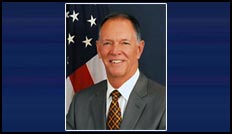SDFM The Business of Defense
-
The FBI is beginning to replace its fingerprint identification system with a next-generation version that will dramatically speed up the time it takes to link prints to an identity. The agency says the next generation identification system reached initial operating capability this month at its Clarksburg, West Virginia information services facility. For high-priority prints, it\'ll be able to find a match in as little as ten minutes - compared to the two hours required for a ten-fingerprint match using the previous generation IAFIS system.
March 28, 2011 -
The FAA has been studying whether tablet devices can replace paper aeronautical charts in the cockpits of planes. And for at least one charter jet company, the answer is yes. The agency has given the go-ahead to a large executive aircraft operator to use iPads equipped with a special app to display charts to pilots electronically through all phases of flight. The decision follows three months of testing - including an in-flight decompression test at 50-thousand feet - in which the device held up just fine.
March 28, 2011 -
March 28th and March 30th, 2011 Tangherlini serves as the principal policy advisor on the development and execution of the budget and performance plans for Treasury
March 28, 2011 -
If a mobile worker is teleworking, does that mean they\'re in the office?
March 28, 2011 -
Career coach Kathryn Troutman of the Resume Place discusses the current federal hiring outlook and how to land a federal job. March 25, 2011
March 25, 2011 -
Ed Schultz Host, MSNBC\'s \"The Ed Show\" Don Hale AFGE DEFCON Chair Patty Viers AFGE DEFCON Vice Chair Brian Leonard AFGE Marine Corps Council President Ron Pollack Families USA Executive Director
March 23, 2011 -
The Department of Homeland Security already has real-time access to biometric data maintained in the FBI\'s huge database of criminal records. Soon, agency officials say they\'ll be able to share similar data with the Defense Department. Biometric information - mainly fingerprints - can be shared between DHS databases and the criminal records the FBI holds at its Criminal Justice Information Services Division in West Virginia. DoD\'s database will be in the loop within the next year - among other things - letting customs and immigration officials instantly know if someone trying to enter the country has been on the battlefield against the US military. The technology could potentially come into play even if the Defense Department hasn\'t positively identified that person. That\'s because the database also includes latent fingerprints taken from improvised explosive devices in Iraq and Afganistan. DoD and DHS say it\'ll be a big improvement over the limited information sharing they conduct now, using slow, manual processes.
March 21, 2011 -
The Health and Human Services department wants researchers and IT developers to use its vast storehouse of data to make new apps. And it\'s trying to make it easier for that to happen. The department has created what it calls a Health Indicators Warehouse - a collection of databases on health indicators, along with application programming interfaces built on Web 2.0 technologies. HHS hopes programmers will come up with innovative ways to use the information it\'s built up in its databases and make it more relevant and more widely available. The agency says the data sets available through the new APIs include 1200 different health indicators from 170 data sources. To get the ball rolling, HHS started developing some of its own apps using the data last year, as part of the Community Health Data Initiative. The apps, and the APIs, are available at health indicators.gov.
March 21, 2011 -
Federal IT policymakers say the days of agency employees having one cell phone for work and other for personal use could soon be a thing of the past. The same could be true of laptops. They\'re exploring the idea of letting federal workers use their personal devices to do their jobs, rather than segregating their work lives onto separate devices. The idea, according to Federal CIO Vivek Kundra is that many employees are already using newer, better technology in their personal lives than the equipment their agency issues them. Under the idea, workers would get a stipend to help pay for technology that they buy on their own, rather than agency-issued devices, and Kundra says federal CIOs can overcome the security challenges. He says as I-T needs continue to become a bigger and bigger part of agencies\' missions, keeping up with the latest technology will rack up unsustainable costs.
March 21, 2011 -
Al Qaida in Iraq has claimed responsibility for last week\'s car bomb attack on an Iraqi army unit that killed at least eight soldiers The bomb targeted an army headquarters in the northern area of Diyala province. 30 others were wounded when it exploded last Monday. Security forces stopped a second attack and defused a car bomb parked at the scene. The attacks in Iraq are a daily occurrence as insurgence continue to attack Iraqi forces knowing that U.S. troops are leaving Iraq totally at the end of this year.
March 21, 2011 -
March 23rd, 2011 at 11 AM Criminal enterprises operating globally - so-called \"Transnational Criminal Organizations\" -- have spent years refining their approaches to all types of illicit trafficking including narcotics, weapons, illicitly gained and laundered money, and even modern day slavery. In many ways, these organizations can be considered multi-national corporations, given their size, reach, and sophistication. Indeed, their production and logistics operations rival best practices in the commercial sector, with highly resilient supply chains driven by the need to minimize the risk of seizure. TCOs often directly and indirectly enable, support, and facilitate insurgencies and terrorism; undermine state stability, security, and sovereignty; and corrupt legitimate global financial and trade networks. The stakes are high. U.S. Law Enforcement, Homeland Security, and the Department of Defense (DoD) find themselves at the front lines of this global security issue. As criminal organizations adapt to traditional interdiction methodologies, stakeholders across government are coming together to stem the tide, looking at what new technologies and whole of government approaches can be brought to bear to address this complex threat.
March 21, 2011 -
One thousand dollars may be waiting for teleworkers someday, if some DC area congressmen have their say.
March 21, 2011 -
March 21st and March 23rd, 2011 A veteran pilot and internationally recognized expert in aviation and labor relations, Babbitt is no stranger to the FAA
March 18, 2011 -
The State Department\'s senior adviser for non-proliferation and arms control says Iran is approaching the capability to produce nuclear weapons. Robert Einhorn told the Arms Control Association yesterday in his own words, \"We believe that at a minimum Iran is moving to the threshold of a nuclear weapons capability.\" But he clarified that he was referring to their intentions rather than their actual capabilities. Some have speculated Iran could reach the point where it could produce a nuke this year.
March 16, 2011 -
Iran wants more information from the U.S. on a former FBI agent who vanished in 2007 claiming they would make an attempt to find him. U.S. Secretary of State Hillary Clinton said last week Washington had seen recent indications that Robert Levinson was being held in southwest Asia and appealed to Iran to help find him, despite past frustration that Tehran had ignored U.S. pleas for information about him.
March 16, 2011





